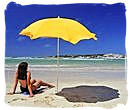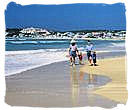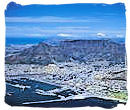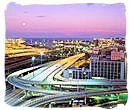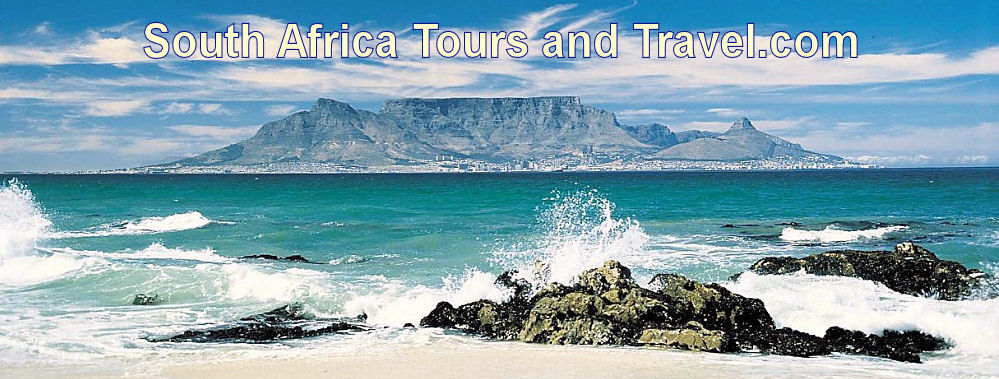 |
||||
How to "Do It Yourself" tips and info for |
||||
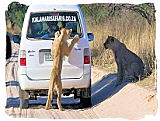
|
They are all written by reputed guidebook authors and travel writers who work for leading guidebook publishers and/or specialized Africa magazines. All have been professionally involved in the safari industry for years and visited many parks and reserves. read more... |
safari travel reviews
They are all written by reputed guidebook authors and travel writers who work for leading guidebook publishers and/or specialized Africa magazines. All have been professionally involved in the safari industry for years and visited many parks and reserves.
read more...
Picture Gallery
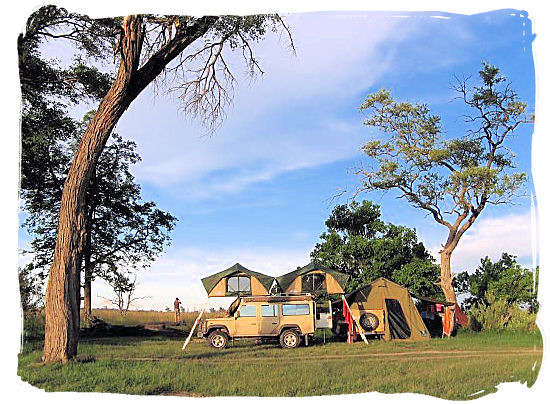
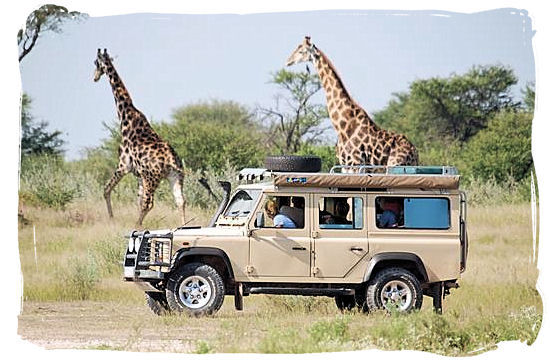
 Fully equipped self drive safari camp in Moremi game reserve in Botswana.
What you see here is the camp of a family comprising mom, dad and five children ranging in age
from 6 (pair of twins) to 16 years on safari in Botswana. Fully equipped in this case means an
eight seater 4 wheel drive Land Rover Defender and a custom designed trailer with a build-in
cooking unit. They are equipped to carry all the needs in terms of foodstuff, liquids, clothes,
petrol etc. for the family to be self-sufficient for 10 days. Sleeping accommodation is in the
form of roof tents on top of the vehicle and the trailer. At night inside the tents the occupants
are quite safe against the wild animals that come wandering in and around the camp. They are used
to vehicles with tents and usually ignore them, provided there is no foodstuff lying around.
Fully equipped self drive safari camp in Moremi game reserve in Botswana.
What you see here is the camp of a family comprising mom, dad and five children ranging in age
from 6 (pair of twins) to 16 years on safari in Botswana. Fully equipped in this case means an
eight seater 4 wheel drive Land Rover Defender and a custom designed trailer with a build-in
cooking unit. They are equipped to carry all the needs in terms of foodstuff, liquids, clothes,
petrol etc. for the family to be self-sufficient for 10 days. Sleeping accommodation is in the
form of roof tents on top of the vehicle and the trailer. At night inside the tents the occupants
are quite safe against the wild animals that come wandering in and around the camp. They are used
to vehicles with tents and usually ignore them, provided there is no foodstuff lying around.
 Giraffe encounter on a self drive safari in Botswana. With the roof-tents
folded up on top of the vehicle and the trailer left behind at the camp, mom, dad and the five
kids are on a game drive, exploring the region surrounding their camp. To come across a pair or
even a herd of giraffes is always a highlight on any game drive. The wonderful thing of a
self-drive safari is that you are fully independent and to do your own thing when and wherever
you want. At the same time it is one of the most cost effective ways to explore Southern Africa's
wildlife parks and game reserves.
Giraffe encounter on a self drive safari in Botswana. With the roof-tents
folded up on top of the vehicle and the trailer left behind at the camp, mom, dad and the five
kids are on a game drive, exploring the region surrounding their camp. To come across a pair or
even a herd of giraffes is always a highlight on any game drive. The wonderful thing of a
self-drive safari is that you are fully independent and to do your own thing when and wherever
you want. At the same time it is one of the most cost effective ways to explore Southern Africa's
wildlife parks and game reserves.copyright © South Africa Tours and Travel.com
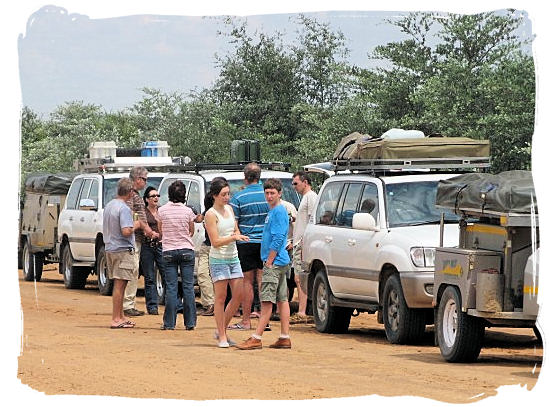
 A Small group of families and friends on a self-drive safari to Khutse game
reserve in Botswana. They all travel in 4 wheel drive vehicles, which is a necessity in Botswana
because of the difficult and often tricky road conditions. In the remote wilderness regions roads
often consist of a couple of tracks only with either deep sand or water and mud, depending on the
season. This is also the reason why tourists are strongly advised to travel with more then one
vehicle in pairs or groups whenever possible. It is a lot safer, one can tow the other out when
he gets stuck in the sand or mud, or go and seek for help at the nearest settlement. When you do
go on your own, keep in mind that the wildlife reserve you want to visit are utterly remote and
uninhabited. If you get stuck it can take days before somebody passes by who can help you. The
minimum you need to take along to enable you to make contact with the outside world and ask for
help is a satellite telephone together with a good GPS system and up to date maps.
copyright © South Africa Tours and Travel.com
A Small group of families and friends on a self-drive safari to Khutse game
reserve in Botswana. They all travel in 4 wheel drive vehicles, which is a necessity in Botswana
because of the difficult and often tricky road conditions. In the remote wilderness regions roads
often consist of a couple of tracks only with either deep sand or water and mud, depending on the
season. This is also the reason why tourists are strongly advised to travel with more then one
vehicle in pairs or groups whenever possible. It is a lot safer, one can tow the other out when
he gets stuck in the sand or mud, or go and seek for help at the nearest settlement. When you do
go on your own, keep in mind that the wildlife reserve you want to visit are utterly remote and
uninhabited. If you get stuck it can take days before somebody passes by who can help you. The
minimum you need to take along to enable you to make contact with the outside world and ask for
help is a satellite telephone together with a good GPS system and up to date maps.
copyright © South Africa Tours and Travel.com
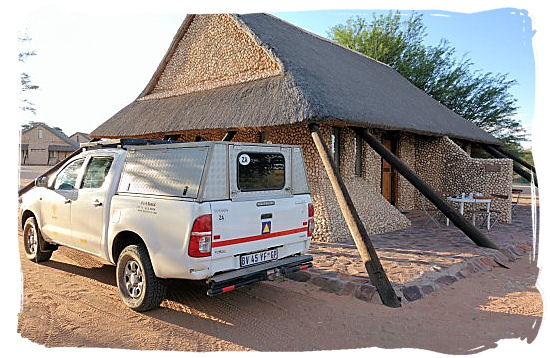
 The 4 wheel drive Toyota Hilux vehicle, especially equipped for safari
travel that we rented for our 8 day self drive safari in the Kgalagadi Transfrontier National
Park. It is parked next to the chalet that we stayed in at the Twee Rivieren main camp of the
Park. Serving a variety of budgets and tastes, the camp offers different types of accommodation
such as chalets, family cottages and camp sites. Covering 3,6 million hectares (38,000 sq km)
Kgalagadi National Park is an amalgamation of the Kalahari Gemsbok Park in South Africa and the
Gemsbok National Park in Botswana. It is situated in the Kalahari, a huge 900,000 sq km semi
desert in the west of Southern Africa. The Park is traversed by two dry river beds, the Auob and
the Nossob, which join each other just north of the Twee Rivieren camp. It is home to a wide variety
of wildlife including predators such as Leopards, Cheetahs, Hyenas and the renowned black-mane
Kalahari Lions.
copyright © South Africa Tours and Travel.com
The 4 wheel drive Toyota Hilux vehicle, especially equipped for safari
travel that we rented for our 8 day self drive safari in the Kgalagadi Transfrontier National
Park. It is parked next to the chalet that we stayed in at the Twee Rivieren main camp of the
Park. Serving a variety of budgets and tastes, the camp offers different types of accommodation
such as chalets, family cottages and camp sites. Covering 3,6 million hectares (38,000 sq km)
Kgalagadi National Park is an amalgamation of the Kalahari Gemsbok Park in South Africa and the
Gemsbok National Park in Botswana. It is situated in the Kalahari, a huge 900,000 sq km semi
desert in the west of Southern Africa. The Park is traversed by two dry river beds, the Auob and
the Nossob, which join each other just north of the Twee Rivieren camp. It is home to a wide variety
of wildlife including predators such as Leopards, Cheetahs, Hyenas and the renowned black-mane
Kalahari Lions.
copyright © South Africa Tours and Travel.com
Video Gallery
A visitor on safari in the Kruger National Park said the following:
"I traveled to Kruger National Park in South Africa and I was so excited to be living out a
childhood dream of mine. I couldn't believe that I was going on a safari in Africa and was going
to be face to face with the Big 5".
Watch this video and see if he really did.
Short video showing how you can experience extraordinary wildlife action on a Self-Drive Safari. It was taken by Mari Auranaune, also in the in the Kruger National Park in South Africa.
This is her story:
When we got there, there were quite a few cars there and they had been there for a little while already (I believe). They had spotted the Leopard on the side of the road. When we got there the leopard was still in the bushes. We could see that it wanted to cross the road and at that time we didn't see the impala. We only knew about the kill until it dragged the impala up on the road. Amazing to watch!! This happened 15 km north of Tshokwane picnic spot towards Satara Camp.
Another amazing video also about a Leopard and again in the Kruger National Park This time a Leopard walks around and around a car, totally absorbed by its reflection on the shiny body of the car. It was taken by Annemarie du Plessis at the Kumana dam south of the Satara rest camp.
Video showing a group of tourists on a Self-Drive Safari in Botswana and Namibia with hired 4x4 vehicles. You will see that conditions are quite different from those in South Africa. The roads are mostly very sandy or muddy depending on the season, so a four wheel drive vehicle is a necessity. Whereas in South Africa's national parks the roads are mostly hardened dirt roads or even tarred in the case of some main routes. All you need is an ordinary two wheel drive vehicle.
